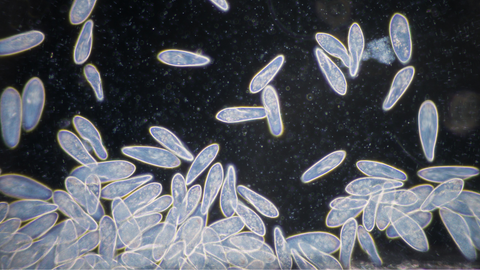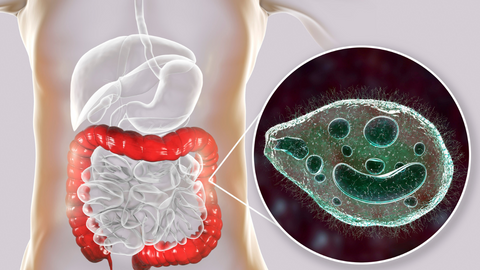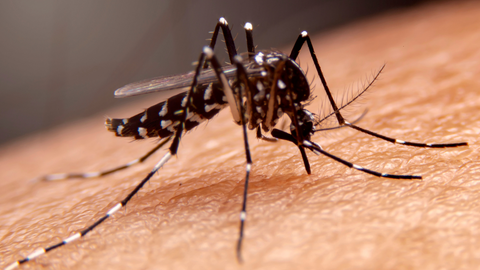What Are Protozoa? Understanding Protozoa and Their Impact on Human Health
March 08, 2024
Protozoa are microscopic organisms that can be either free-living or parasitic. Though they are invisible to the naked eye, they have an immense influence on both ecological systems and human health. These single-celled organisms, with their diverse forms and functions, play pivotal roles in nutrient cycling, food webs, and disease transmission.
In this article, we discuss protozoa in detail, exploring their different types and classifications, their ecological significance, their role in human health, associated diseases, treatment modalities, and preventive measures.
What Are Protozoa?

Protozoa, originating from the Greek words "protos" (meaning first) and "zoon" (meaning animal), inhabit an abundance of different environments and ecosystems, ranging from freshwater bodies and soil to the gastrointestinal tracts of animals and humans. (1) Despite their microscopic size, protozoa have remarkable complexity at the cellular level, containing organelles such as nuclei, mitochondria, and specialized structures for movement and feeding. They are taxonomically classified into several phyla based on their mode of movement, including amoeboids, flagellates, ciliates, and sporozoans. (1)
Protozoa play important roles in the ecosystem, serving as primary consumers, predators, and decomposers at a microscopic level. They eat organic matter and microbes, which helps recycle nutrients and keep microbial communities balanced. They also pass energy and nutrients to other organisms in food webs, affecting how many and where different species are found.
Protozoa and Human Health

While many protozoa are harmless or even beneficial, certain species pose significant threats to human health. Protozoal infections can result from the ingestion of contaminated food or water, vector-borne transmission, or direct contact with infected individuals. (2) Diseases caused by protozoa range from mild gastroenteritis to severe and life-threatening conditions. Malaria, for example, caused by Plasmodium parasites transmitted through the bite of infected mosquitoes, remains a major global health concern, particularly in regions with limited access to healthcare and vector control measures. (3)
Protozoa as Human Parasites
Protozoa, as parasites, can have a profound impact on human health by causing a range of diseases. These single-celled organisms have evolved various strategies to infect and survive within their human hosts. For instance, certain protozoa, like Plasmodium species, which cause malaria, enter the bloodstream through the bite of infected mosquitoes. Once inside the body, they invade red blood cells, leading to symptoms such as fever, chills, and fatigue. (3) Similarly, parasites like Giardia lamblia and Entamoeba histolytica can infect the gastrointestinal tract, causing symptoms like diarrhea, abdominal pain, and nausea.
Protozoal infections can result in malnutrition, dehydration, and, in severe cases, organ damage or failure. (4) Additionally, individuals with weakened immune systems, such as children, pregnant women, and immunocompromised individuals, are particularly vulnerable to the effects of protozoal infections. The impact of these diseases is particularly high in regions with inadequate sanitation, limited access to clean water, and poor healthcare.
Examples of Diseases Caused By Protozoa

Protozoal diseases cover a spectrum of illnesses affecting humans and animals worldwide. Some of the most notable examples include:
- Malaria: Plasmodium parasites, including P. falciparum, P. vivax, and P. malariae, cause malaria, characterized by cyclic fever, chills, and flu-like symptoms. Without prompt diagnosis and treatment, severe malaria can lead to organ failure and death. (3)
- Amoebiasis: Entamoeba histolytica, a protozoan parasite, is responsible for amoebiasis, a gastrointestinal infection prevalent in developing countries. Symptoms range from mild abdominal discomfort to severe dysentery and liver abscesses. (4)
- Giardiasis: Giardia lamblia, a flagellated protozoan, causes giardiasis, manifesting as diarrhea, abdominal cramps, and bloating. Transmission occurs through the ingestion of contaminated water or food. (5)
Treatment Modalities for Protozoal Infections
Effective management of protozoal infections relies on targeted antimicrobial therapy tailored to the specific parasite species involved. Antimalarial drugs such as artemisinin-based combination therapies (ACTs), quinine, and chloroquine are most commonly used for malaria treatment, while metronidazole and tinidazole are more effective medications against amoebiasis and giardiasis. However, emerging drug resistance has made some of these drugs less effective, so it is important that there is ongoing research into protozoa infections and methods of treatment.
Getting Rid of Protozoan Parasite Infections
Interestingly, though protozoan parasites are the smallest type of human parasites, they are also the deadliest. If you get malaria or experience any severe symptoms of infection, it is critical to seek professional medical attention immediately.
However, some protozoan parasites, like Giardia and Entamoeba histolytica, can make us sick but aren't usually life-threatening. To deal with these less serious infections, it is useful to have antiparasitic herbal remedies available, such as our Parasite Detox tonic. This tonic contains wormwood, green black walnut hulls, and cloves – three of the most renowned antiparasitic herbs.
Wormwood has a substance called artemisinin that's been used to fight a range of parasitic infections, including protozoa and helminths (worms). Green black walnut has juglone, which also has strong antiparasitic properties. Cloves have eugenol, which also may work against a range of intestinal parasites.
Protozoa are everywhere, yet invisible to the naked eye, so we never really know when we can be exposed until we start experiencing symptoms – such as food poisoning, cramping, or other gastrointestinal issues. In these instances, it is great to have a parasite detox tonic on hand to support the elimination of the protozoan parasite.
However, it is important to consult with your doctor to make sure these ingredients are right for you, especially if you are currently taking any medications. Additionally, it is important to seek medical attention if you are experiencing any serious symptoms of infection, as protozoan infections can be life-threatening.
Of course, the best thing we can do is to try to prevent an infection in the first place.
Preventive Measures

Preventing protozoal infections requires a multifaceted approach that encompasses both public health interventions and individual behaviors. Some of the best strategies include:
- Access to Clean Water and Sanitation: Ensuring adequate access to clean, potable water and sanitation facilities reduces the risk of waterborne protozoal infections.
- Health Education: Promoting hygiene practices, including handwashing, safe food handling, and proper waste disposal, empowers individuals and communities to reduce the transmission of protozoal infections.
- Vaccination: Developing vaccines against protozoal diseases, such as malaria and toxoplasmosis, holds promise for preventing infection and reducing disease burden in endemic regions. (6)
Summary
Protozoa, though small in size, have a big influence in both ecological systems and human health. By understanding protozoa and their impact on health, transmission, symptoms, treatments, and preventative measures, we can mitigate the impact of protozoal diseases on individuals and communities worldwide.
References
1 https://www.ncbi.nlm.nih.gov/books/NBK8325/
2 https://www.ncbi.nlm.nih.gov/books/NBK8043/
3 https://www.ncbi.nlm.nih.gov/books/NBK551711/
4 https://www.ncbi.nlm.nih.gov/books/NBK519535/
True Health Starts with Feeding the Body


